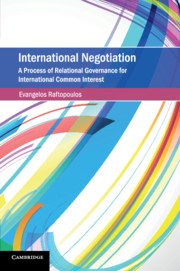'Raftopoulos challenges scholars of international relations and international law to think of the treaty process as an integrated set of interim, subjective practices. He promotes a relational theory that treats the links between negotiations and treaties as an ongoing process of promoting global welfare. His approach goes well beyond conventional strategic power based theories of international relations and static positive theories by international lawyers about the nature of multilateralism itself.'
Peter M. Haas - University of Massachusetts, Amherst
'When I was involved in negotiations for drafting treaties, I often had the feeling that the negotiators, rather than putting forward particular positions, were called to define an international common interest and to envisage a regime subject to future governance and re-negotiation. This book goes beyond feelings and subjects the process of building international common interests to a rigorous analysis within a solid theoretical approach.'
Tullio Scovazzi - University of Milano-Bicocca, Milan
Professor Evangelos Raftopoulos presents a new and welcome perspective on the international negotiation process. Without doubt this in-depth and thought-provoking study of international negotiations of legal instruments will generate much discussion as he takes the reader through the matrix of the international negotiation process through both an intellectual and pragmatic lens. Professor Raftopoulos demonstrates his extensive knowledge of the complexities and intricacies of international negotiations in this masterfully written book.'
Nilufer Oral - Istanbul Bilgi University and Member of the UN International Law Commission
'Negotiations are traditionally perceived as belonging to the realm policy; the frequent end result of it, treaties, as belonging to the realm of law. This interesting and innovative study by a leading Greek international law scholar brings both strands together in the analysis as to how they contribute to the crystallization of international common interest.'
Robert Kolb - University of Geneva
'As a colleague of Professor Evangelos Raftopoulos, I would like to express my satisfaction that Cambridge University Press is publishing his book entitled International Negotiation: A Process of Relational Governance to International Common Interest. Although it is not evident from the title of this forthcoming book and the one that I received from Professor Raftopoulos many years ago, there are many problems and principles of public international law that form the basis of the content of both books. The title of the former book of Professor Raftopoulos that I mentioned is The Inadequacy of the Contractual Analogy in the Law of Treaties published in 1990. I congratulate Professor Raftopoulos for adding the interesting new book of the Greek Professor to the fundamental literature of international law.'
Budislav Vukas - University of Zagreb
‘The South China Sea arbitration … is so far the first attempt by a claimant State in the South China Sea to resort the dispute to a third party forum … (and) it does not make a desired contribution to resolving the real dispute … Nevertheless, it does motivate China and ASEAN to speed up the negotiation on the consultation of the Code of Conduct. Raftopoulos’ book, viewing international negotiation as a process of relational governance based on the analytical framework of international common interest, will shed light on countries who are in favor of preference for negotiation in managing international disputes. The book generates much discussion on the matrix of the international negotiation process through both an intellectual and pragmatic lens, and should be read by academics and practitioners of international law and negotiations, officials of international organizations, and anyone interested in the interdisciplinary study of international law and international relations.’
Dr Nong Hong
Source: Ocean Yearbook



